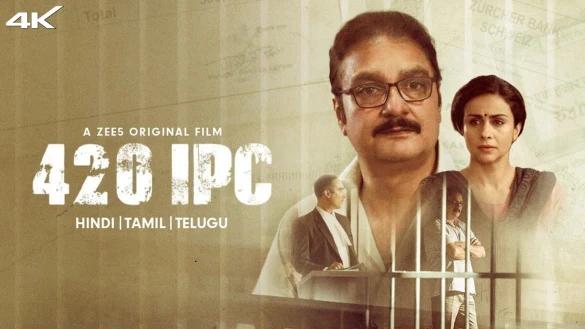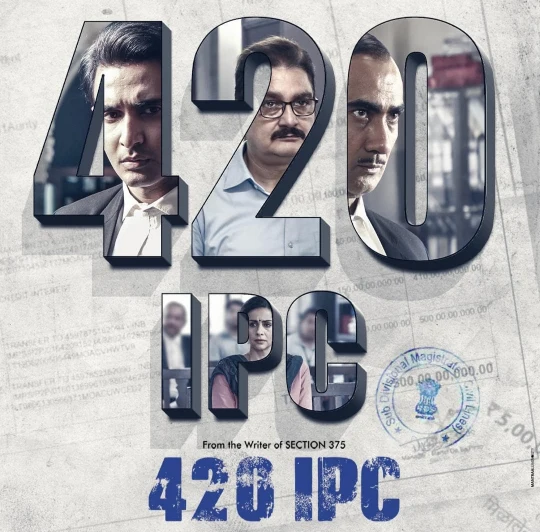IPC 420 Movie Review – A Deep Dive into Crime, Drama, and Deception
🎬 Introduction to IPC 420 Movie
The IPC 420 movie captures the raw essence of deception, fraud, and betrayal while reflecting on the Indian Penal Code section 420 that deals with cheating. The film takes the audience into a gripping world where lies and truth collide, highlighting the social and emotional consequences of scams. Right from the first frame, the IPC 420 movie hooks viewers with its dramatic tone and layered storytelling. Unlike lighthearted crime dramas, it attempts to mirror the harsh realities of fraud that impact people on personal and financial levels.
By drawing from real-life inspirations and legal references, the IPC movie goes beyond being a mere crime drama. It brings attention to loopholes in society, greed-driven individuals, and the vulnerabilities of victims. For viewers who are drawn to courtroom thrillers and morally complex narratives, the movie provides a cinematic experience that feels both educational and entertaining. It sets the tone for deeper discussions about ethics, law, and justice.
🕵️ Storyline and Plot of IPC 420 Movie
The storyline of IPC 420 movie revolves around a con artist who uses charm, manipulation, and intelligence to trick unsuspecting people. Initially, the character appears likeable, creating a sense of trust before weaving a web of lies. The movie explores how deception can be masked under sophistication, and how ordinary people often fall prey to it. The twists in the story highlight the fine line between ambition and greed, making the audience question the true nature of morality.

As the plot unfolds, the audience is exposed to the devastating consequences of fraudulent schemes. Families lose their savings, relationships collapse, and trust shatters. Each scene intensifies the emotional weight, portraying the real cost of dishonesty. The IPC 420 movie also integrates courtroom drama sequences, adding an additional layer of tension as justice is sought. These courtroom battles not only fuel the narrative but also educate the audience about how Section 420 is applied in real cases.
👥 Characters and Performances in IPC 420 Movie
The IPC 420 movie thrives on its strong cast. The lead actor, portraying the con artist, delivers a layered performance that makes audiences feel conflicted. At times, his charm is undeniable, while at other moments his deceit makes viewers despise him. Supporting characters, including victims, family members, and legal authorities, bring depth to the story by portraying different perspectives on fraud and justice.
Performances are emotionally charged and authentic, especially in the scenes where victims realize they’ve been deceived. The courtroom performances add intensity, with sharp dialogues that reflect the clash between truth and lies. Each character in IPC 420 movie contributes to the moral debate, leaving the audience reflecting on whether crime ever truly pays.
🎥 Direction and Cinematic Style of IPC 420 Movie
The director of IPC 420 movie employs a sharp storytelling style that balances entertainment with awareness. The use of tight camera angles during interrogation and courtroom sequences adds to the suspense, while wide shots capture the loneliness of victims who lose everything. The film’s pacing ensures that the audience remains engaged, with each revelation building towards a powerful climax.
The director avoids glorifying fraud and instead focuses on the aftermath, which gives the movie a socially responsible tone. Symbolism is used effectively—such as showing broken mirrors to represent shattered trust or dimly lit rooms to signify hidden truths. These choices elevate the cinematic experience, making the IPC 420 movie not just a thriller, but also a commentary on human flaws.
🎶 Music and Background Score in IPC 420 Movie
Music plays a significant role in heightening the emotions of IPC 420 movie. The background score builds suspense during con sequences, while softer tunes underline the vulnerability of victims. Unlike commercial crime films, the music here is subtle, designed to support the storytelling rather than overpower it.
Courtroom scenes are enhanced by tense orchestral notes, while dramatic revelations are underscored by sudden musical shifts. The soundtrack resonates even after the film ends, reminding audiences of the emotional journey they witnessed. This careful integration of music with narrative ensures that the IPC 420 movie leaves a lasting impression.
📝 Themes and Messages of IPC 420 Movie
At its core, the IPC 420 movie is not just about fraud—it is about human greed, broken trust, and the pursuit of justice. The film explores how desperation can push individuals into criminal activities, and how victims struggle to rebuild after betrayal. It also emphasizes the importance of law enforcement and the judiciary in protecting society from manipulation and exploitation.
Another strong message is the impact of greed on relationships. Families torn apart by fraud are shown in heartbreaking detail, reinforcing the reality that financial crimes are not victimless. By using relatable situations and characters, the IPC 420 movie reminds viewers of the value of honesty, accountability, and vigilance in daily life.

⚖️ Legal Representation and Courtroom Drama
The IPC 420 delivers intense courtroom sequences that keep audiences on the edge. Lawyers present evidence and question witnesses with precision. The prosecution works tirelessly to expose lies, while the defense counters with clever tactics. Every hearing feels like a high-stakes battle, making viewers feel the tension firsthand.
The courtroom scenes also emphasize the emotional weight of the trials. Victims reveal pain and fear, while the con artist uses every trick to manipulate the system. The 420 movie shows how persistence, strategy, and sharp thinking can uncover truth even in the face of deception.
This section of the film educates viewers about legal procedures. It explains how evidence matters, how witnesses impact cases, and how law protects victims. By blending drama with education, the movie makes courtroom battles both thrilling and informative.
🌍 Social Relevance of IPC 420
movie reflects society’s vulnerability to fraud and deceit. Scammers exploit trust, targeting those who seek quick success or financial gain. Victims lose money, relationships, and confidence, and the film portrays these consequences with raw realism. The story encourages audiences to stay vigilant and make informed choices.
The movie also highlights how fraud affects communities. Families break apart, emotional stress builds, and social trust weakens. movie portrays these effects thoughtfully, urging viewers to recognize the broader impact of dishonesty.
By combining storytelling with a social message, the film educates and entertains. Audiences learn to value honesty and vigilance while engaging with the dramatic narrative. It becomes more than a movie—it turns into a reminder of the importance of ethics and caution in everyday life.
📸 Cinematography and Visual Appeal in Movie
The cinematography in movie enhances every scene. Dim lighting and tight angles show the con artist’s hidden motives, while courtroom scenes use bright lighting to symbolize transparency and justice. Each shot reflects the story’s mood and heightens tension, making audiences feel immersed.
Symbolism strengthens the visual storytelling. Broken mirrors, scattered money, and isolated shots highlight betrayal and loss. Close-ups capture subtle emotions, showing fear, cunning, or heartbreak. Wide shots give a sense of loneliness after deception strikes, emphasizing the real-world impact of fraud.
Together, the visuals elevate IPC 420 beyond a simple crime drama. The cinematography works with the story to engage viewers emotionally while reinforcing key themes of trust, loss, and vigilance.
🏆 Critical Reception of IPC 420
Critics praised movie for its realistic depiction of fraud. The film refuses to glamorize deception, showing the pain and consequences instead. Performances, especially by the lead actor, received acclaim for balancing charm with moral ambiguity. Supporting characters also strengthened the story, making every scene feel authentic.
Some critics noted the movie’s pacing is slower than typical thrillers. They highlighted the emotional intensity as challenging for casual viewers. Still, the strong performances, direction, and social relevance outweighed these minor critiques.
Overall, movie earned recognition for sparking conversations about fraud and vigilance. Critics appreciated how the film educates while entertaining, creating a thoughtful and engaging cinematic experience.
🎯 Audience Response to IPC 420
Audiences connected deeply with movie. Many viewers found the story relatable, especially those who experienced scams in real life. Courtroom sequences impressed audiences, showing the struggle to achieve justice and expose deceit. Social media buzz showed viewers discussing fraud prevention, ethics, and vigilance after watching the film.
Families appreciated the realistic portrayal of emotional and financial losses. Professionals valued the educational aspects, learning about the consequences of fraud and legal procedures. Some viewers felt the pacing was slower, but most praised the detailed storytelling and character depth.
The movie successfully balances entertainment, education, and social awareness. It leaves audiences reflecting on honesty, accountability, and the impact of deception in real life.
🏁 Conclusion: Why Movie Stands Out
movie stands out for combining crime, drama, law, and morality. It shows the real cost of fraud, emphasizing the struggles victims face. Emotional turmoil, legal battles, and clever manipulations make the story gripping and thought-provoking.
Unlike typical thrillers, the film avoids glamorizing scams. Instead, it educates viewers about vigilance, ethics, and the role of law in protecting society. Every scene reinforces the importance of honesty and trust.
Through strong performances, cinematography, and storytelling, IPC 420 movie delivers both entertainment and awareness. The narrative leaves a lasting impression, encouraging audiences to value integrity, question appearances, and take lessons from the consequences of deception.



